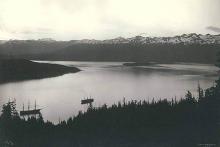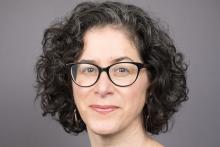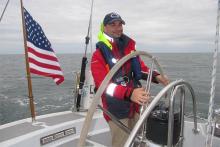Jen Rose Smith (dAXunhyuu/Eyak), assistant professor of geography and American Indian studies at the University of Washington, will visit Penn State on March 28
Content Administrator
Department of Geography Undergraduate student scholarships
- The Jeff Gockley Memorial Award
- The Balmat Family Scholarship in Geography
- The G.D. Richardson and Kathy LaSauce Undergraduate Scholarship in Geography, in the College of Earth and Mineral Sciences
- E. Willard Miller Award in Geography
Other sources of financial support
- Undergraduate students may apply for departmental Academic Enrichment Support for research and travel opportunities.
- Undergraduate students may use GeoGraphics Lab's student research poster printing program for technical support to print posters for presentation at conferences.
- College of Earth and Mineral Sciences Financial aid for undergraduate students
- University Undergraduate Research and Fellowships Mentoring opportunities and funding
- Erickson Discovery Grant (named for emeritus professor of geography/Penn State president Rodney A. Erickson)
- Undergraduate Research Conference Presentation Support
- University Student Engagement Network (SEN) Grant Program
Rachel Weber, professor of urban planning and policy at the University of Illinois at Chicago, will present "Seizing the Means of Prediction: Why the Future Belongs to Property Speculators," at the Depar
Penn State Resources
- Penn State Career Services now offers Virtual Career Services, including meetings with career counselors; mock interviews; workshops; online job fairs, and more!
- Nittany Lion Careers – log in to to attend virtual events, search and apply for jobs and interviews, and more.
Other Resources
- American Association of Geographers Jobs & Careers resources
- More AAG Career Resources
- Practicing Geography: Careers for Enhancing Society & the Environment
- AAG Guide to Geography Programs – detailed information on geography programs throughout the U.S., Canada, and Latin America
- American Association of Geographers (AAG): https://www.aag.org/jobs-careers/
- American Geographical Society (AGS): https://www.americangeo.org/
- American Planning Association (APA): https://www.planning.org/careercenter/
- American Society for Photogrammetry and Remote Sensing (ASPRS): https://www.asprs.org/
- Ecological Society of America (ESA): https://www.esa.org/
- Keystone GIS (formerly PaMAGIC): https://www.pamagic.org/
- North American Cartographic Information Society (NACIS): https://nacis.org/
- Pennsylvania Geographical Society (PGS): https://thepgs.org/
- United States Geospatial Intelligence Foundation (USGIF): https://usgif.org/
- Urban and Regional Information Systems Association (URISA): https://urisa-portal.org/
Undergraduate Research Opportunities Connection (UROC) offers research and professional development opportunities in the Department of Geography. These opportunities allow undergraduate students to gain valuable research experience and technical skills through collaboration on projects within the department and supervised by faculty and/or graduate students, as well as 1-3 credit hours to apply towards graduation.
GEOG 495 Internship provides a mechanism to award credit for geography-related internships. Per University policy, students are awarded 1 credit for each 45 hours of effort; per department policy, students may earn 1-4 credits per experience.
GIS E-Education Job Postings | running list of job and internship opportunities in the field of geography.
NSF Research Experiences for Undergraduates (REU) | the REU program, funded and run by the National Science Foundation, provides research opportunities for undergrads in a variety of fields. Among these fields are Social, Behavioral, and Economic Sciences and Earth Sciences. These positions are open only to U.S. citizens/permanent residents. Students graduating in May are not eligible.
Undergraduate Research and Fellowships Mentoring (UFRM) | fellowships and research are a great way to fund and further your education. The University Fellowships Office is the dedicated office to support Penn State students looking to apply for the variety of available fellowships and research opportunities.
City Semester Pittsburgh: Urban Sustainability | City Semester Pittsburgh is a unique learning experience for Penn State students of all majors and backgrounds who would like spend a semester learning about Pittsburgh’s urban dynamics. While participating in the program, students will intern with a prominent community partner and take an engaging online course in sustainability. Students will further explore real-world issues in climate action, architectural design, clean energy, landscape architecture, urban equality, education, and more.
SEED Semester at Shaver’s Creek Environmental Center | Get outside and off campus for your spring semester! The forests, fields, and creeks of Penn State’s outdoor education field lab, Shaver’s Creek Environmental Center, become your classroom for this full-semester experiential journey of outdoor leadership and environmental interpretation courses. The SEED Semester (previously called the Discovery, or “Block” Semester) has been providing transformative engaged scholarship experiences for Penn State students since 1979. Graduates of the program have gone on to work as park naturalists, environmental educators, corporate team building facilitators, high ropes course instructors, classroom teachers, park researchers and managers, and university faculty. You’ll spend your days with like-minded classmates engaging in real world, hands-on experiences teaching children and families about the natural world. You will work side-by-side with our experienced outdoor educators, team building facilitators, and naturalists to gain a holistic set of outdoor leadership skills.
Endowed faculty positions help create and sustain great universities. Named chairs, professorships and faculty fellowships are powerful tools for recruiting and retaining teachers and researchers who are among the most distinguished scholars in their fields. Highly talented graduate and undergraduate students also seek to learn from faculty of such calibre.
To solar or not to solar? While a stable and predictable profit is an important factor to PA farmers considering leasing out their land for solar energy development, it’s not enough on its own, according to a new study led by Penn State researchers, including Erica Smithwick and Jenn Baka.
The Office of the Senior Vice President for Research has announced a transition at the helm of the Institute for Computational Data Sciences (ICDS): Guido Cervone, a renowned expert in computational science and geoinformatics, will become the interim director of ICDS, effective April 1. He will take over from Jenni Evans, professor of meteorology and atmospheric science, who will retire in June after a distinguished career at Penn State.
Joshua Inwood, professor of geography and African American studies at Penn State, recently co-authored the article, "The Living Black Atlas: Learning Geospatial Ethics from the African American Freedom Struggle." The article delves into the historical significance of cartography within African American communities and its role in resistance, storytelling and community empowerment.
This newsletter is a publication of the Department of Geography in the College of Earth and Mineral Sciences at Penn State.






